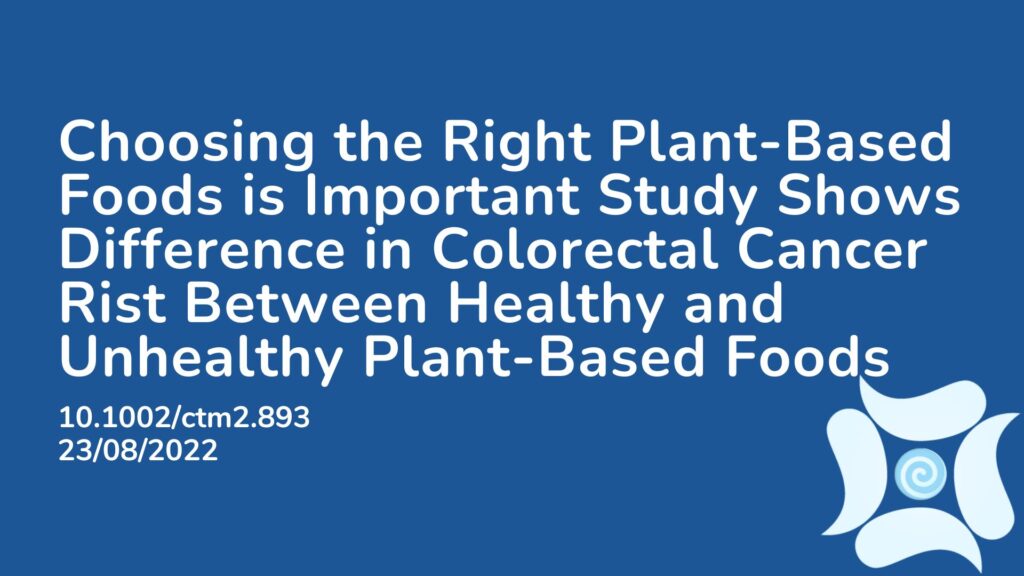Summary: Colorectal cancer (CRC) remains to be the second most common type of cancer causing death worldwide, hypothesised to be largely attributed to poor quality diets and a lack of fibre intake. Western-style diets, typically high in saturated fats and processed meats, is linked with an increased likelihood of developing CRC. On the contrary to that, several fibre rich plant based foods such as fruit, vegetables and whole grains have been associated with a lower CRC risk. However, not all plant based foods are considered to be healthy. When choosing to be on a plant based diet, consumers still have many processed food choices which are plant based but not necessarily healthy, for example refined grains and many soft drinks. These foods are associated with higher risks of cardiometabolic diseases as well as CRC. Therefore it is essential to understand the differences between healthy and unhealthy plant based foods when advocating for a plant based diet in the prevention of disease. This present paper is a prospective study that looks at whether there is a difference between plant based foods when assessing CRC incidence. The authors used data from two previous prospective cohort studies, the Nurses’ Health Study (NHS) and the Health Professionals Follow-up Study (HPFS). The NHS enrolled 121,700 people and the HPFS enrolled 51,529. The participants received frequent questionnaires to obtain information on dietary patterns and current health conditions. The results showed that unhealthier plant-based food choices such as refined grains and a diet higher in sugar is associated with higher risk of CRC, whilst healthy plant based food options such as natural grains, fruits and vegetables is associated with lower risk and incidence of CRC. Research like this further affirms that it is not just about sticking to popular dietary trends – but choosing the right food, no matter which popular diet the food items belong to.
Abstract:
Objective: To evaluate the randomized controlled trials (RCTs) of Curcumin and Curcuma longa Extract in the treatment of autoimmune diseases. Methods: Databases such as Embase, Web of Science, PubMed and The Cochrane Library were searched from the database establishment to February 2022 to collect RCTs of Curcumin and Curcuma longa Extract in the treatment of autoimmune diseases. Then the literature was screened and the data were extracted. Meta-analysis was performed using RevMan 5.3 software. Results: A total of 34 records were included, involving 31 RCTs and 10 types of autoimmune disease. Among them, ankylosing spondylitis (AS) involves one RCT, Behcet’s disease (BD) involves one RCT, Crohn’s disease involves two RCTs, multiple sclerosis (MS) involves two RCTs, oral lichen planus involves six RCTs, psoriasis involves two RCTs, rheumatoid arthritis (RA) involves five RCTs, systemic lupus erythematosus (SLE) involves two RCTs, arteritis involves one RCT, ulcerative colitis (UC) involves nine RCTs. Among them, most of the RCTs of ulcerative colitis (UC), oral lichen planus, RA showed that curcumin and curcumin extracts improved clinical or laboratory results. Crohn’s disease, MS, SLE, psoriasis included two RCTs; they all showed improvements (at least one RCT reported improvements in clinical outcomes). AS, BD and arteritis included only one RCT, and the clinical results showed improvement. However, due to the small number of RCTs and the small number of patients involved in each disease, there is still a need for more high-quality RCTs. Conclusion: Curcumin and Curcuma longa Extract had good clinical efficacy in the treatment of Psoriasis, UC and RA, so Curcumin and Curcuma longa Extract could be used in the treatment of the above diseases in the future. The results of Meta-analysis showed that Curcumin and Curcuma longa Extract did not show efficacy in the treatment of oral lichen planus, while Takayasu arteritis, SLE, MS, AS, BD and CD did not report sufficient clinical data for meta-analysis. Therefore, large-sample, multi-center clinical trials are still needed for revision or validation.
Article Publication Date: 23/08/2022
DOI: 10.1002/ctm2.893




